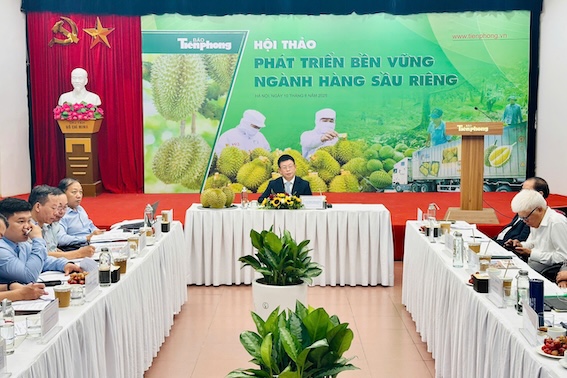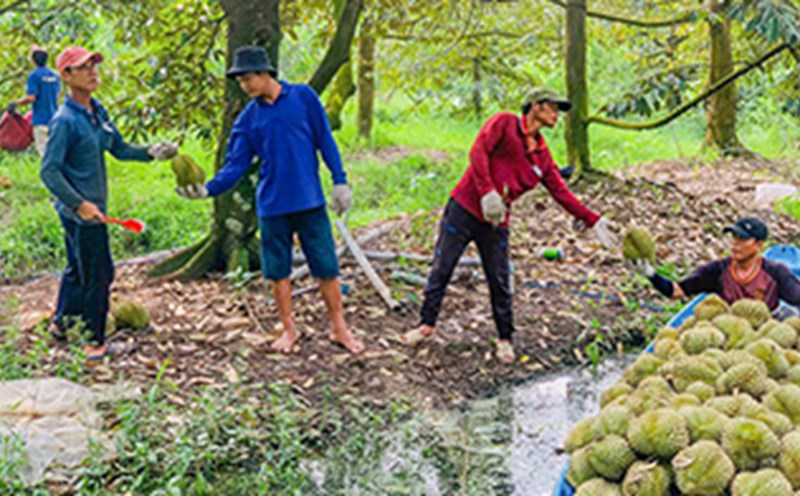There are many shortcomings
At the workshop "Sustainable development of the durian industry" held on June 10, many representatives of enterprises, industry associations as well as representatives of the Ministry of Agriculture and Environment shared about the challenges the durian industry faces after a period of "hot" growth.
Representing the enterprise, Ms. Nguyen Thi Thanh Thuc - Chairwoman of the Board of Directors and General Director of Auto Agri Software Technology Joint Stock Company said that there are still many shortcomings in durian exports today.
"I am not surprised when durian exports plummet. Because of the "hot" growth of durian in the past 2 years, it sometimes leads to the subjectivity of management agencies, investors and people in particular. Many people see durian grow hotly and bring huge profits, so they are willing to cut down other trees to grow durian or are willing to buy land for investment, which leads to many risks.
Another thing is that we are a bit subjective about the Chinese market. As a business that has worked with Chinese traders for many years, we know that when launching a certain policy, it means that their preparation is very ready and they have enough tools to check," said Ms. Thu.


Meanwhile, according to Mr. Dang Phuc Nguyen - General Secretary of the Vietnam Fruit and Vegetable Association, the incident of many private batches of durian exported by Vietnam to China being discovered containing cadimi heavy metal residues exceeding the prescribed threshold has created negative, profound and multifaceted impacts for the billion-dollar industry.
"Not only a warning about food safety, this incident is also a harsh test of quality management capacity, brand reputation and sustainability of Vietnam's key agricultural export activities," said Mr. Dang Phuc Nguyen - General Secretary of the Vietnam Fruit and Vegetable Association.
Is Vietnamese durian unjustly blamed for O gold?
Faced with such "hot" growth, the Ministry of Agriculture and Environment held a major conference to warn about growth and warn of many risks and risks that this could lead to.
According to Mr. Nguyen Quang Hieu - Deputy Director of the Department of Crop Production and Plant Protection (Ministry of Agriculture and Environment), as soon as it was first notified in March 2024, from China about cadimi, the Department of Crop Production and Plant Protection conducted many extensive and in-depth investigations, in which some areas with high cadimi residues were discovered.
The main reason for durian to still have cadimi remnants is determined to be due to factors such as soil and soil, combined with many areas of cultivation not being rested, causing cadimi contamination. In addition, it is also due to the habit of people using fertilizers in areas more than recommended.
"Regarding O gold, when China added regulations on O gold, it was discovered on Thailand's durian. This substance is often used after harvest. Therefore, to prevent risks from all countries, China applies them in general to Vietnam," said Mr. Nguyen Quang Hieu.
However, regarding O gold, Mr. Dang Phuc Nguyen said that the farming process is based on productivity, lacking input control, which has unintentionally put toxins into the production chain. In particular, O gold - an industrial dye chemical used by many people to create a beautiful yellow color for durian peels, evenly ripening the fruit.
Regarding the story of why Thailand reacted quickly but Vietnam reacted slowly, the Department of Crop Production and Plant Protection said that since January 9, when China's regulations were implemented, the Department had sent a list of inspection rooms to the Chinese side for recognition.
Then, on January 17, the recognition of Vietnamese and Thai laboratories took place at the same time. The Department of Crop Production and Plant Protection has also widely banned the use of chemicals due to the requirements of the business unit.











